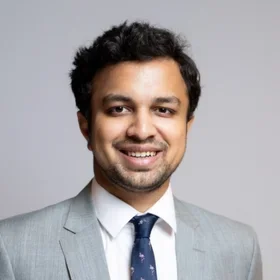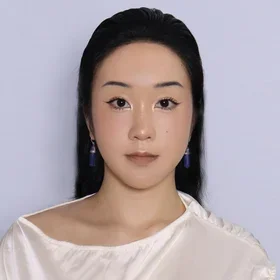By Shana Childs (’14JRN)
Jalen Young, a 2018 Columbia HBCU Fellow and Strategic Communication graduate, is a believer in the supernatural. It’s the inspiration behind Boo Hag or Shadow Man, his Afro-horror screenplay that’s now available to stream in 40 million homes through FOX Soul and AspireTV.
“I don’t think I’ll ever be able to know for certain exactly how the script got in front of the right people, but I do believe that it had a lot to do with God, my training, persistence, and having the right team. I’m grateful to all those who helped because it took so many people to bring that script to fruition.”
After graduating from Morehouse College in Atlanta in 2018, Young was accepted into the prestigious Columbia HBCU Fellowship Program, which gave him a full scholarship, including housing in New York, to earn an M.S. in Strategic Communication. He credits the curriculum with tightening his creative pitches and strengthening his overall ability to communicate in professional settings. In addition, Young says Columbia’s resources and people are unmatched: “I can personally say Columbia has the resources to help bring you one step closer to whatever you want.”
Since Columbia, Young has earned an M.F.A. in Writing for Television and Film from the University of Southern California, started teaching college film courses, and hit the ground running with screenwriting in Los Angeles, where he’s currently living. What’s next? “I’ve finally gotten to a place in my career where I am contractually obligated to not talk about what I’m doing—which is really a ‘thank God’ moment,” he says.
Young reflected on the recent success of his screenplay and how Columbia SPS has complemented his professional journey. Edited excerpts follow.
How did you manage to prioritize your craft while being a student?
At Columbia and Morehouse College, I had many people around who consistently encouraged me to pursue my dreams professionally. I did not formally study film at Morehouse, but I got involved with the Morehouse Filmmakers Association, first joining as a freshman and eventually becoming the president. I also had many great mentors at Morehouse, like Dr. Levar Smith and Dr. Ilya Davis, who pushed me.
At Columbia, many professors and administrators pushed me to marry my main course of study to my passion for storytelling—people like then-Dean Jason Wingard; Dr. Tatum Thomas, the senior associate dean of student affairs at the time; Joshua Mackey, the assistant director of student life at the time; Imani McDonald in the Office of the Dean of Student Affairs; and Strategic Communication lecturer Dr. Don Waisanen, among others. In fact, Don Waisanen, my professor in the Strategic Storyteller course, helped me to develop my application materials for USC’s film school, including writing one of my recommendation letters (he also went to USC!).
Why a master’s degree in Strategic Communication, and why from Columbia?
As I approached college graduation, I had initially planned to earn a master’s in cultural anthropology. That was until a professor of mine, Dr. Levar Smith, encouraged me to check out the Columbia HBCU Fellowship Program. At the time, while I really liked storytelling, my writing needed work. If I wanted my creative work to be taken seriously, then I needed to learn how to professionally communicate, sell myself as a writer, and reiterate my value added to a project—these are all skills I gained from the Strategic Communication master’s program. The program also taught me how to market to various audiences and cultures.
Did you have a favorite professor or class at Columbia?
I actually had a few! Don Waisanen, who taught Strategic Storytelling; Frank Oswald, who taught Morals and Ethics; Gabriel Amor; Matthew Sawyer; and really quite a few more. Not only were they just good people in general, but they really took the time and effort to encourage me in my pursuit of screenwriting—one way or another!
I also audited a few classes from Columbia’s film school. I learned a lot just by taking advantage of the resources right next door to SPS. Also, Professor Jamal Joseph at the film school was very helpful; he teaches free story courses in Harlem when he’s not teaching at the film school.
What advice would you give to current or future Columbia HBCU Fellows?
An Ivy League school believes you are valuable enough for them to invest wild amounts of money to pay your tuition to learn at their school. You were that valuable before Columbia gave that validation, but you now have a responsibility to prove them right—especially for those who will come after you. If you didn’t have an obligation to be the best in the room before, you do now. Your professors, faculty, and guides are there to help, and they will help if you seek them!
What’s next for you?
All I can say is stay tuned—there’s more coming from me that will be available very soon!
About the M.S. in Strategic Communication Program
The business world’s around-the-clock communications challenges are demanding a new level of strategic thinking. Columbia University’s Master of Science in Strategic Communication graduates emerge equipped with all the essential skills and tools for a successful career in a wide range of communication fields. The program is available in three formats for professionals of varying experience levels and locations: the Executive M.S., for experienced (6+ years) communication leaders (36 credits in 16 months for degree completion); Full-Time M.S., for early-career communication professionals and career changers (36 credits in 12 to 16 months for degree completion); and Part-Time M.S., for working professionals looking for flexibility (36 credits in 24 months to 3 years for degree completion).
Application deadlines for fall 2023 enrollment are quickly approaching. Visit the admissions deadlines pages for your chosen format for dates: Executive M.S.; Full-Time M.S.; and Part-Time M.S.


